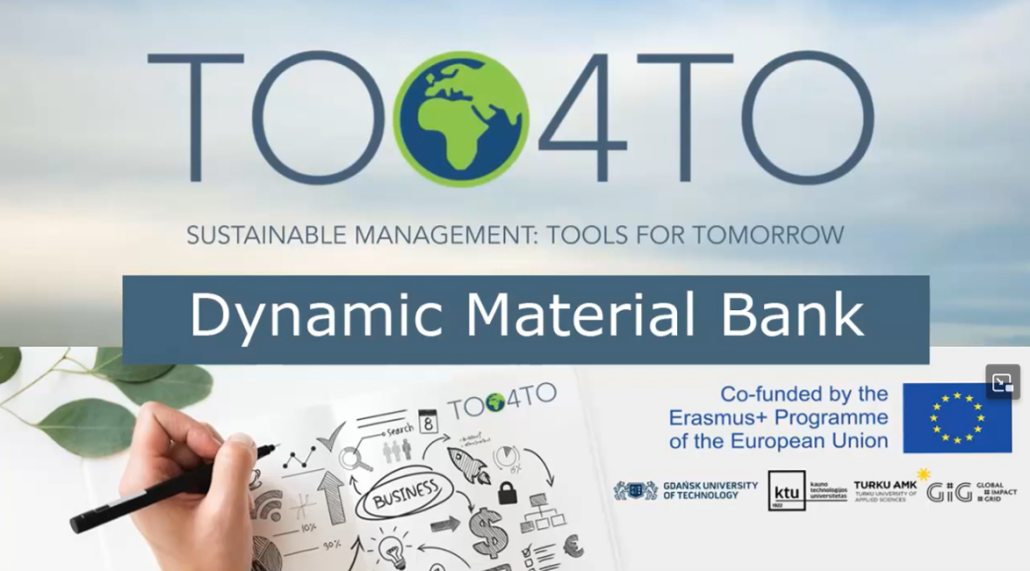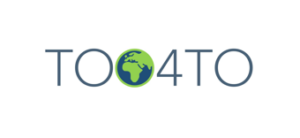Dynamic material bank (DMB) – is the first output of the project – with the main aim to review the most recent and relevant materials devoted to sustainability that are applicable in an organisational context in the EU and beyond and create a dynamic (updateable) open-access database (bank) of various information references (materials). All materials are available on open access, providing opportunities for everyone having access to the Internet to reach and use the materials for learning purposes.
Click the image below or the following link to access Dynamic Material Bank: https://open.ktu.edu/course/view.php?id=115&lang=en

FOR WHOM IS THE RESULT INTENDED?
DMB provides information relevant to various target groups wishing to develop and align their business practices with EU-supported SDGs:
- Educational institutions (Teachers of higher education; Students) within the EU and elsewhere may find the DMB providing them with valuable materials they can incorporate into their curricula and learning materials.
- Businesses alike can benefit from the material and implement the guidance into their business practices.
- Decision makers and representatives of public administration and decision makers may use it as a source of up-to-date knowledge on sustainability and apply it in their work for the best effect.
- Researchers may also use DMB as quick access to up-to-date sources.
WHAT USE IS THE RESULT FOR?
The DMB was the foundation for the development of further project outputs: Training Curriculum, e-learning modules and materials and Guide to virtual teams. DMB, as part of the learning materials, directly impacts learning outcomes. DMB and other outputs of the project can be used as complex tools oriented to the development of competences oriented to sustainable management, or as separate tools, with the availability to be integrated in the existent courses or as additional material.
As the DMB is created under the Moodle platform Database activity, it could be linked to other Moodle courses, and the assignment regarding updating the DMB could be exported to other Moodle courses in different educational institutions. Moodle Database activity allows the teachers and/or students to build, display and search a bank of record entries about any conceivable topic. The format and structure of these entries can be almost unlimited, including images, files, URLs, numbers and text, amongst other things.
All the users of DMB are co-creators of this platform. Therefore, you are welcome to search, update and disseminate it. Technical issues regarding the updating and usage are explained in the DMB User Guide.
The development of DMB has started mapping out the current state-of-the-art pertinent to corporate sustainability, reflecting the critical learning needs of students and teachers identified in the conducted surveys, as well as the current and upcoming labour market needs. It was the background to pick the most relevant areas of sustainability to be analysed and developed in DMB and other TOO4TO activities. The idea was to ensure that students are equipped with knowledge most relevant to their learning needs in relation to the barriers and pathways of sustainable development in an organisational context applicable within the EU (e.g. alignment with EU policies) and beyond (e.g. alignment with UN SDGs). The construction of the curriculum is built on interdisciplinary and collaboration needs. The DMB material is classified under six themes (referred as “Sustainability Area” at DMB) which appeared to be most appealing for respondents and the introductory one:
(0) Basics of Sustainability and Sustainable Management
(1) Corporate Social and Environmental Sustainability
(2) Sustainable Resource Management
(3) Climate Change and Sustainability
(4) Sustainable Energy Solutions
(5) Circular Economy, Economic and Sustainability, Sustainable Production
(6) Artificial Intelligence and Sustainability
The DMB material for each theme includes open-access bibliography and active links to various information forms (referred to as “Category” in the DMB):
- Regulations, policies (EU and global)
- Best practice examples from industry
- Scientific articles and other scientific publications
- Software and other tools
- Reports (global, regional, national or industry level)
- International research projects (results)
- Updates, insights from the business organisations
Each reference in DMB has a connection link identified to the specific UN SDGs or all of them.
The search of material in the DMB is available based on the sustainability areas, categories, SDGs and keywords within the DMB.
Elements of Innovation pedagogy is an integral part of DMB, providing learners with guidance on how to acquire, update and apply new knowledge and information even beyond the official updates of the dynamic material bank and to utilise it for the updates of DMB material.
INFOGRAPHIC – DMB


